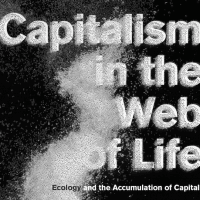-
After alienation
Since the collapse of the Berlin wall and the Soviet Union, many on the left seem to have swallowed the idea that there is no alternative to capitalism.
-
‘Socialism a necessity for human survival’
According to John Bellamy Foster, the world environmental crisis is a systemic crisis, a product of capitalism, and requires systemic changes in the capitalist system. He says that environmental sustainability is incompatible with capitalism.
-
Why we must protect the world from the United States
Fifty years ago, Dr. Martin Luther King Jr. stated the obvious: The United States was the greatest purveyor of violence in the world. He also said the public allowing this violence would lead to a kind of national spiritual death that would continue to make the U.S. state a danger to the world.
-
On January 15, 1919: Rosa Luxemburg was murdered
The great revolutionary Rosa Luxemburg was murdered by Freikorp in Berlin, and her body thrown into the Landwehr Canal on this day in 1919.
-
Profits before people: capitalists abandon Alzheimer’s and Parkinson’s research
Pharmaceutical giant Pfizer will stop research on Alzheimer’s and Parkinson’s disease, and is expected to lay-off 300 research and development staff in Massachusetts and Connecticut, in a move that could severely hamper progress towards effective treatments for these illnesses – proving that critical medical research cannot be left in the hands of capitalist profiteers.
-
On the contribution of István Mészáros (1930-2017) to critical thinking
István Mészáros, an outstanding Hungarian Marxist philosopher, died on October 1st 2017 in London. Born in Budapest in 1930 into a working-class family, brought up by his mother, he began working in industry at the age of twelve. He actually lied about his age, claiming to be sixteen, in order to be accepted by the factory.
-
Rosa Luxemburg: Reform or Revolution
To commemorate the anniversary of Rosa Luxemburg’s murder in 1919, we republish the following introduction to a 2014 Mexican edition of her important work, Reform or Revolution. The legacy of this martyr for proletarian revolution endures through her ideas.
-
Abolition feminism: Theories & practices
Nicos Poulantzas Institute presents Angela Davis for the Eleventh Annual Nicos Poulantzas Memorial Lecture.
-
The kids aren’t alright
When we talk about generations, we tend to talk as if history has always been divided up into them. But the idea of distinct eras of cohorts each defined by some unique spirit is not timeless. The notion of a generation was borne of a conception of history as a machine of progress—a claim central to Enlightenment ideology
-
The total Marx and the total theory of literature
Revolutionary reflections is proud to publish a lost gem of Marxist aesthetic theory by Ian Birchall. Originally the piece was given as a paper at a conference on the Grundrisse and the “total Marx” on 5 June 1971 (the day after the death of Marxist theoretician Georg Lukács). It was published in Situating Marx: Evaluations […]
-
Radical food politics: hunger is political
Mexie on the politics of food and hunger.
-
Ecology and value theory
Jason W Moores Capitalism in the Web of Life sets itself the challenge of locating an account of capitalist commodity production inspired by Karl Marx within the biological, chemical and geological totality we normally call nature. The ambition of the book is therefore immense. Moore proposes a method for understanding world history that shows how economic development is connected to long-wave ecological transformations. At a time when humanity faces profound and simultaneous ecological and economic crises, Moore proposes a kind of meta-theory that explains them as the outcomes of a single logic.
-
Safe spaces for colonial apologists
The recent controversies about Oxford Professor Nigel Biggar’s “Ethics and Empire” project and UK Universities Minister Jo Johnson’s attack on “safe space culture” have both been defended on freedom of speech grounds. However, they are better understood as retrenching colonial thinking in universities.
-
Trashing the planet for profit
Before I began this essay I read through some of my past forays that mentioned climate change and capitalism, the first I think, being in 2006 where I opined in a piece on the ‘War on Terror’.
-
Illusions of world-ecology
Every airport bookstore features books with titles like 10 Ways to Retire Rich, 150 Places You Must Visit Before You Die, or 8 Easy Steps to a Flatter Tummy, with the numbers in very large type on their covers. They are the publishing equivalent of junk food, quickie books written to match titles that were invented by the marketing department to generate impulse purchases. The authors and publisher of A History of the World in Seven Cheap Things must have had such books in mind when they chose its title and designed its cover.
-
Schumpeter’s two theories of imperialism
Schumpeter’s theory is interesting for several reasons. It was formulated at the same time as Lenin’s and Luxemburg’s and clearly with the knowledge of the two. It reacts to the exactly the same events as theirs. It is different though and it was held by Schumpeter throughout his life. The key text for Schumpeter’s theory is “The sociology of imperialisms” (note the plural) published in 1918-19.
-
Advertising at the edge of the apocalypse
In this article I wish to make a simple claim: 20th century advertising is the most powerful and sustained system of propaganda in human history and its cumulative cultural effects, unless quickly checked, will be responsible for destroying the world as we know it. As it achieves this it will be responsible for the deaths of hundreds of thousands of non-western peoples and will prevent the peoples of the world from achieving true happiness.
-
21st-century Marx
The 21st century has already welcomed back Karl Marx (1818-1883), rather on the assumption that he had faded away and has now returned to haunt us. After the financial crashes of 2008, his leonine face appeared on international news magazine covers, feature articles in quality broadsheets, TV documentaries and blogposts. The questions Why now? and Why Marx? are easily answered: capitalism suddenly appeared unstable, unmanageable, dangerously fragile and anxiously threatening.
-
The new Mafia capitalism
MISHA GLENNY’S new series McMafia was launched on BBC TV on New Year’s Day. It is an appropriate if depressing opener for the new year.
-
Social Reproduction Theory: going beyond Marx’s Capital
Colin Barker of Manchester rs21 introduced a panel discussion to launch the book Social Reproduction Theory: Remapping Class, Recentering Oppression at the recent Historical Materialism conference in London . We reproduce Colin’s presentation here.




















